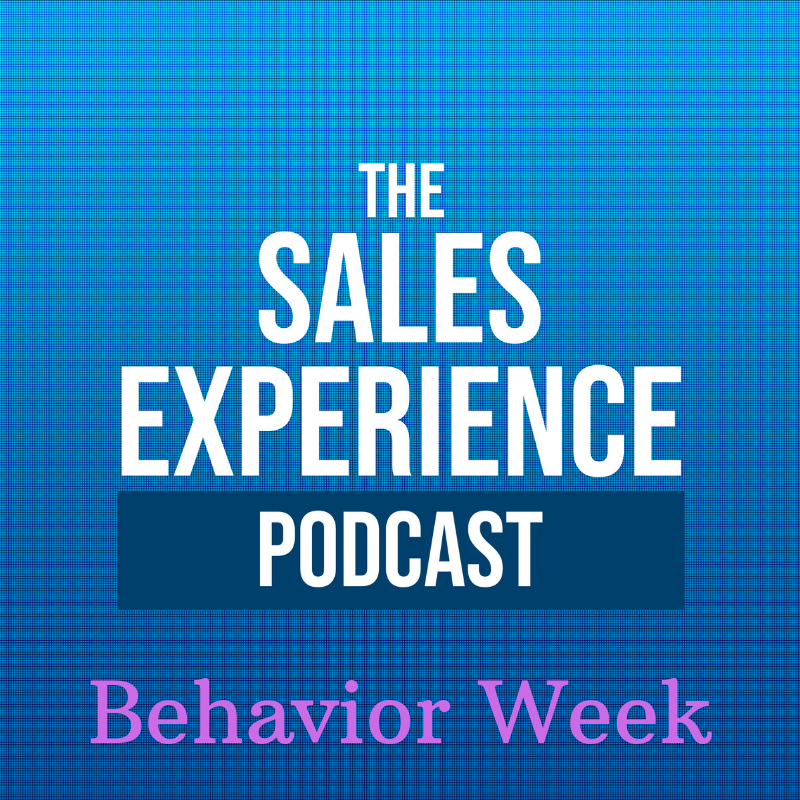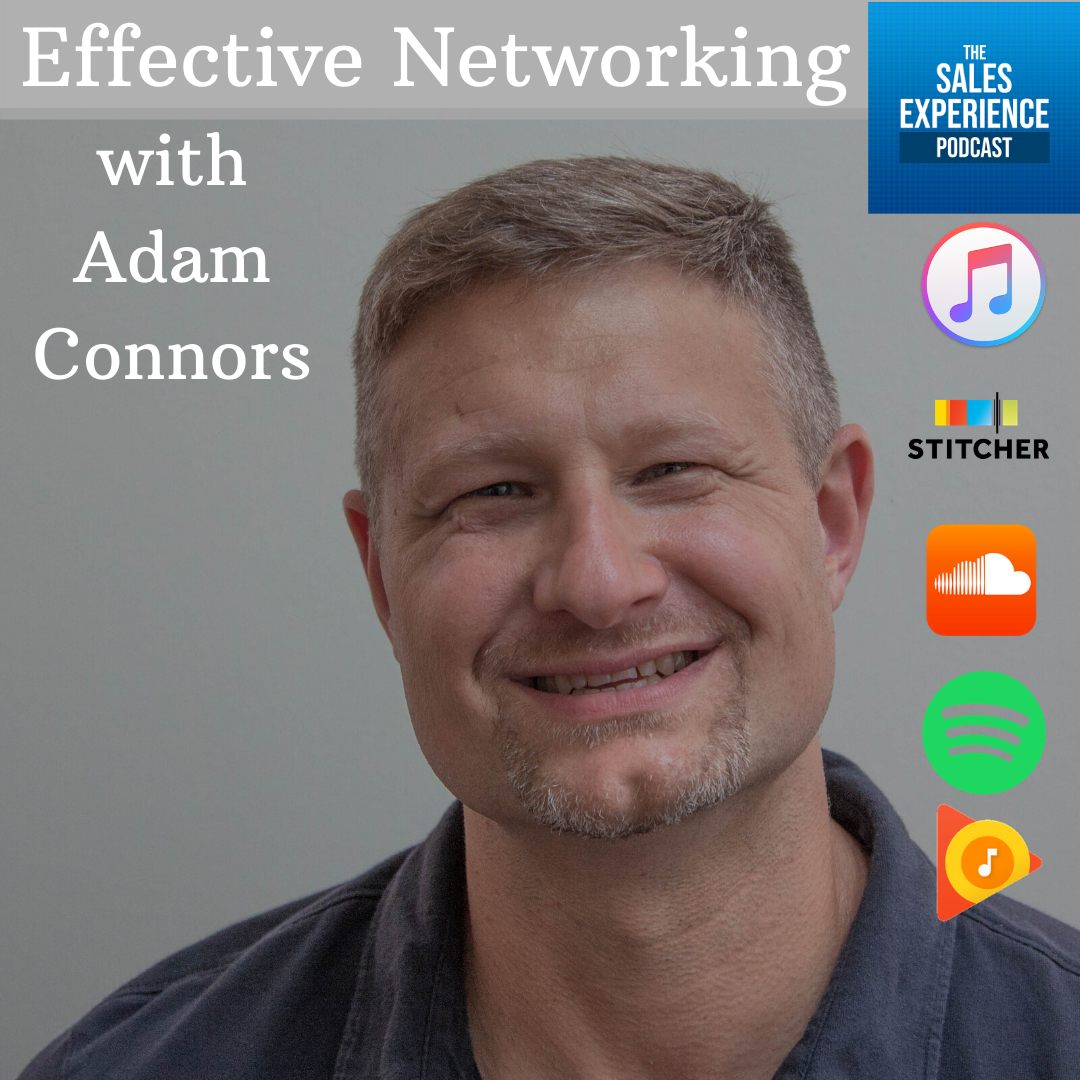Show Notes
There are times when your prospect has a request or needs something different outside of your current pricing or terms.
Most salespeople will tell the prospect no (it’s not possible) and then try and convince the prospect that it is okay, and they should buy anyway.
In this episode, I argue why that is the wrong approach, the proper way to handle it, and why it is so important to always be advocating for your prospecting.
I also share a warning for salespeople who take this advice and do it wrong.
Episode 99 – Transcript
Welcome back to another episode of the sales experience podcast. My name again is Jason Cutters. So glad that you’re here. Please. Before I get into this, make sure that you subscribe to the show, rate it, review it, share it with everybody. You know, all of that. I really appreciate it. It’s so fun to get feedback and to chat with people who have listened to the show and things that they like. Ideas that they have, topics I should cover, interviews I should do, people they want me to talk to.
All of that is great and all of that is thanks to people like yourself who have downloaded this or listening to it and hopefully sharing it with others. Yeah. This week I am covering closing strategies, which if you’ve listened to the shows in the past, you know that it’s all about building up to the close and if you listened to episode 96 I talked about how you don’t necessarily need a closing strategy.
If you’re doing everything right up until that moment where the sale is about to transact, you should just be assumptive and then roll into it because you shouldn’t need to use manipulation, even much persuasion strategies into order to convince them to buy from you. They should be wanting to buy from you. In fact, when you really do it right, and this isn’t going to happen every single time with every single person, but they should be begging you to buy from you what you’re offering because what you’re offering is the perfect solution for their problem or for the goal that they have and where they want to be. They should be literally pulling out their money, their credit card, whatever it is in order to buy from you, hoping that you will sell them what you’re offering. That’s literally the pinnacle of where you want to be.
And then once you do that, they should be thanking you, not you thanking them for their business. They should be thanking you that you help them, that you solve their issue. This segues into what I wanted to talk about today, which is the higher authority close. Now. This is one of those that I think is actually really important to use when you’re in a sales process with your prospect.
Now, what’s the higher authority close? The Higher Authority close is where there’s somebody above you who’s making the decisions, right? It’s not you that’s making the decisions. It’s somebody else. For example, they want a special deal or a special price or you have a contract and they don’t want to do the contract, whatever it might be for your product or service, you always want to ensure that there’s somebody else higher up the chain. Now, if you’re listening to this, you’re a salesperson.
Of course, there’s somebody higher up the chain because you have a sales manager, give somebody team lead. Whoever it is that is making those decisions, setting the framework and may or may not have the ability to override those for the sake of getting the deal done. Now, if you’ve listened to the show, you know that I’m not in the closes and this might seem like a really weird thing for me to say is to make sure you have this close in place and that this close is very valuable, but it is and here is why during your sales process, when you’re building the bright sales experience for you and for that prospect and you’re taking them through the steps, you’ve built your rapport, you have empathy for their situation, they trust you, you’re providing them hope, and then you’re pushing on the urgency for why they need the solution.
Now instead of waiting because you know that the pain or the goals are more important than procrastinating and putting things off, then at this point you have become their ally. In essence, your goal really is to be their advocate on behalf of them, towards your company, towards your product or service, not necessarily against your product or service, but you’re on their side. A lot of times, and I hear some really successful salespeople do this. They’re using words like us and we are an hour, right? The salesperson is actually having them and the prospect to be on the same team moving towards the solution that the company is providing, that your company has the product or the service and yes, as a salesperson, as a professional, it’s not you versus them. It’s not you trying to close them and them trying not to get ripped off, right?
That’s the old sales model. It’s you and them versus the world. You are going to help them. You are going to put them in a better position. You are getting them across the finish line. Now what does that mean? That means that if you’re on their side, it’s you and they arm in arm moving in the right direction, right, and not the direction they want to go because where they’ve been their whole life as a result of their own choices and you’re trying to move them to a better place. That arm and arm going, the direction that you see as a professional of where they should go. That means you guys are allies. You and they are allies on the same team. And if they ask you for something or they need a price discount or they need to spread out payments and you tell them no, all of a sudden, you’ve gone from arm to arm ally, we’re taking on the world, we’re crossing this finish line together.
I will make sure we do this two, wait a second, maybe we’re not on the same team and now I’m back to being a salesperson. You’re back to being a prospect and now it’s us against each other. Now it’s me versus you because you asked me for this thing, and I couldn’t do it. Yeah. And I said, no, now it’s me versus you. And this is a huge distinction because mentally that puts that wall back up where it’s me versus you. It’s salesperson versus prospect and you never want that to happen. You want those walls to go down. You want them to trust you. And then I’m assuming you’re a good person who wants to help people out with your product or service, not just sell them crap they don’t need. And you’re listening to this show because of that, and you want to be on their side.
Do you want to be their advocate and their ally? And then when it comes to a request that they have, if you don’t know the answer or you can’t do it or you’re not sure what’s going to happen, it’s outside the framework of the normal pricing or terms or options or whatever that might be. Then what you want to do is make sure that you defer that to a higher authority. You know, you can say things like, I’m not sure we can do that. I don’t know if that’s possible but let me talk to my manager and see if I can get that done for you. Right? Yeah. And then you go to your manager and get them involved. Either they give you a yes or no, or do they get on the phone or they come into your meeting or they step in and then they’re the ones who are doing it.
But fundamentally, at the end of the day, here’s the point. Yeah. Of the Higher Authority close. It’s you never want to be the bad guy. You never want to be the person telling them no on behalf of the company because again, those barriers then go back up. It’s clear to them that you’re just a salesperson because you won’t give them what they want. Now, if your manager says no or your manager tells you no, and you have to relay that back to the prospect, the answer is no for whatever their question was, then it’s still you and them versus your manager because the manager said, no. Hey, I’m sorry. I talked to my manager and they said we couldn’t do that, but they gave me this other option. Would this work? Instead, I really tried. I was talking to them and I was fighting for this and I was hoping to get this done for you, but unfortunately they said, no, but maybe we can do this, this or this.
That still leaves you in the position of being their ally and they’re advocates. Here’s the one big caveat with this is that where I see a lot of salespeople go wrong or do this inappropriately is when they’re the ally and the advocate for the prospect against the company at the company’s expense. So then their goal as a salesperson is to get that sale no matter what, to not upset the prospect, no matter what, not hurt their feelings, not lose the deal, not have them run away because they’re mad at the salesperson and the salesperson is willing to do whatever it takes to close that deal at the company’s expense. Even producing an unprofitable deal, a terrible deal for the company, a terrible file, a terrible client who’s not a good fit for what the company is offering, product or service, and then you’ve just got this hot mess.
Now on the backend, on the operation side, on customer service side, on retention, it’s just terrible. So you’ve got to be careful. I see a lot of salespeople do this where it’s [inaudible] them and their prospect versus the company because a salesperson just wants to make the sale and will do anything it takes. Even if that means hurting the business.
There’s always a fine line with that where you want to be the ally and advocate for the customer, but with your loyalties primarily being to the company first because that’s who pays you the business is in business to make money and to make profit. That’s why it’s there and hopefully in win-win situations with its prospects. But you’ve got to always remember where your loyalties lie first. That’s so important. So remember, wrapping this up, your goal should never to be the bad guy.
You always want to be the one that’s helping your prospect, their ally, their advocate, anything comes up if they ask you something you don’t know or they asked for something that you know you don’t have access to, say yes to always defer that to a manager. Put them on hold. Yeah. take a break from your meeting. Find your manager, talk to your manager if necessary to get your manager involved. If your manager becomes the bad guy because your manager says no, then you’re still in the right light with your prospect, which is the important part.
That’s it for another episode of the sales experience podcast. Thank you so much for listening and as always, remember that everything in life is sales and people remember the experience you gave them.
![[E99] Closing Week: How to never be the bad guy](https://episodes.castos.com/salesexperiencepodcast/images/TSEP-Cover-Closing-Week.png)


